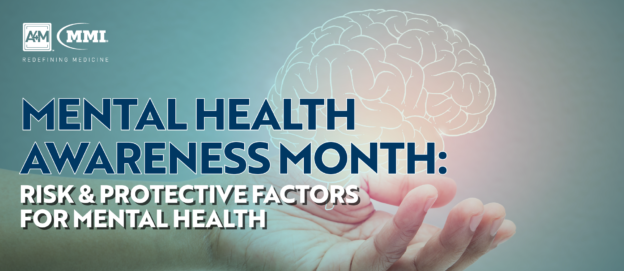Millions of Americans currently live with a mental illness, and it is estimated that 1 in 5 people will be affected by one in their lifetime. May is Mental Health Awareness Month, during which the National Alliance on Mental Illness, Mental Health America and many other organizations aim to raise awareness of, and aid people with mental illness. By fighting stigma, educating the public, and advocating for policies, these associations work to inspire millions of people worldwide and support those in need.
A host of factors are involved in the development of mental health disorders, ranging from environmental and biophysical to those of a more psychological nature, such as traumatic life experiences. However, certain risk and protective factors have been identified to help prevent and treat at-risk individuals. Mental health issues stem from more than one risk factor, and often one protective factor is not enough to stop the development of disorders. However, many individuals do not develop mental illnesses even under the stress of multiple risk factors – resiliency is a key determinant in mental health conditions. It is important to remember that all individuals experience negative emotions such as pain, stress, and anger in different ways and that there is no single cause of mental illness.
Common Risk Factors
Risk factors for mental health are biological, psychological, family, community or cultural characteristics that are associated with a higher likelihood of mental health issues. Below is a list of common risk factors, which should be evaluated with care to prevent the development of mental illness in identifiable at-risk individuals.
Individual Attributes
– Early onset puberty
– Difficult temperament
– Low self-esteem or perceived incompetence
– Anxiety
– Insecure attachment
– Poor social skills
– Extreme need for approval and social acceptance
– Early substance use
Biophysical Factors
– Family history of mental health issues
– Personal history of traumatic brain injury
– Chronic medical conditions (e.g. diabetes, cancer)
– Poor nutrition
– Lack of sleep
– Substance use
Social Factors
– Childhood abuse
– Abusive relationship or friendship
– Recent loss
– Bullying
– Poverty
– Discrimination
– Lack of access to support services
– Peer rejection
– Poor academic achievement
Psychological Factors
– Stressful life situations
– Traumatic life experiences
– Negative outlook
– Perception of insignificance
– Conflicting religious beliefs
A protective factor is a biological, psychological, family, community or cultural characteristic that can reduce the negative impact of a risk factor and lower the likelihood of mental health issues. In considering the list of common protective factors below, it is important to remember that the presence of one or more may not be enough to mitigate an individual’s risk for developing mental illness.
Individual Attributes
– Set of moral beliefs
– Future orientation
– Achievement motivation
– High self-esteem
– Good coping skills
– Emotional self-regulation
– Academic achievement
– Intellectual development
– Communication skills
Biophysical Factors
– Secure attachment as a child
– Healthy diet
– Regular exercise
– Positive physical development
Social Factors
– Ability to make friends
– Good peer relationships
– Supportive family relationship
– Participation in group activities or organizations
– Economic security
– Access to support services
Psychological Factors
– Reliable support from caregivers
– Following rules or obeying the law
– Subjective sense of self-sufficiency
– Optimism
– Positive self-regard
Alongside careful consideration of risk and protective factors, maintenance of good physical health and wellbeing is essential to promoting mental wellness. A nutritious diet, sufficient amounts of sleep, and regular physical activity are key elements of a healthy lifestyle, which have all been shown to have an effect on mental health. By taking care of the body and mind with positive actions such as practicing mindfulness or meditation, learning stress-coping techniques, and engaging in self-care individuals can reduce their risk of developing mental health issues and alleviate symptoms of those already present.

